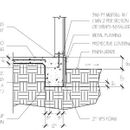Insulated slab in Climate Zone 5B?
Hi, I’m working on drawings for a shed, and planning ahead, in case it becomes a tiny home in the future. I’ve read GBA articles on this subject, including the latest one from April 15th.
On another project, we did horizontal insulation under the slab, and radiant tubing. We found that we didn’t really need the tubing, since the insulation kept the garage floor warm. On this project, we might add electric radiant heat later on.
In my attached drawing, I’m showing an insulated perimeter. For Zone 5B, knowing that we might add electric radiant heat later, should we also add horizontal insulation under the slab?
GBA Detail Library
A collection of one thousand construction details organized by climate and house part










Replies
If there's any chance the slab will be heated in the future it's a good idea to have insulation under the slab (in ANY climate zone, but for sure in 5B.) Of course you can always add insulation above the slab when you decide to implement the radiant floor heating, but it's more expensive and complicated than under slab insulation.
The slab edge insulation in the drawing doesn't meet IRC code minimums on two factors:
*The R-value of 2" XPS isn't warranteed for more than R9, despite being labeled R10. As the climate damaging HFC blowing agents diffuse out over a few decades performance drops toward it's fully depleted performance of R8.4. Though the warranty still says 90% of labeled R, who is going to file the warranty claim in 50 years? At 2.5" Type II (1.5lbs per cubic foot density) or Type IX (2lbs density) EPS would be R10.5 now, and R10.5 in 50 years, and it's blown with fairly benign pentane, most of which escapes the foam and is recaptured at the factory.
**The second code deficiency on the slab edge insulation is that it only extends a foot below grade. For zone 5 the IRC calls out 2 feet below grade minimum. You may be able to get out of that by extending buried "wing" insulation horizontally for 2-3' out from the slab edge insulation at the bottom level of the grade beam, a common feature for frost protected shallow foundations. As-drawn it could frost heave on you UNLESS the slab is heated.
Using cheaper Type VIII roofing EPS (1.25lbs per cubic foot density) or Type I (1lbs density) would be fine for both the sub-slab and slab edge insulation, but go at least 3", since it's performance could drop to under R3.5/inch in below grade applications as it takes on some water:
https://www.insulfoam.com/wp-content/uploads/2014/04/InsulGrade-BelowGrade-MoistureResistanceStudy.pdf
Used roofing EPS (usually Type VIII) is dirt cheap if there is a foam reclaimer near you, but for a 240' shed it's not worth going too far afield for used stuff- virgin stock is cheap enough.
delted double post
Hi Dana, thanks very much for the good advice,
Miles
Miles,
For more information on this issue, see "Determining Sub-Slab Rigid Foam Thickness."
Hi Martin,
Thanks very much. I'll check it out. And thanks for all of your great articles in Fine Homebuilding over the years. I have really enjoyed them.
Miles
+1 on using an unheated building FPSF design.